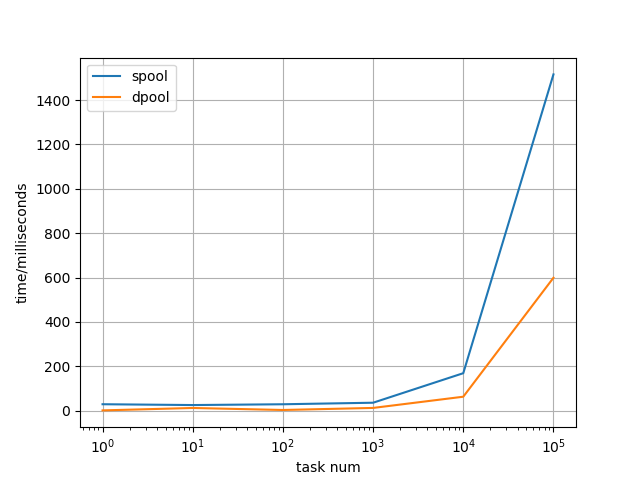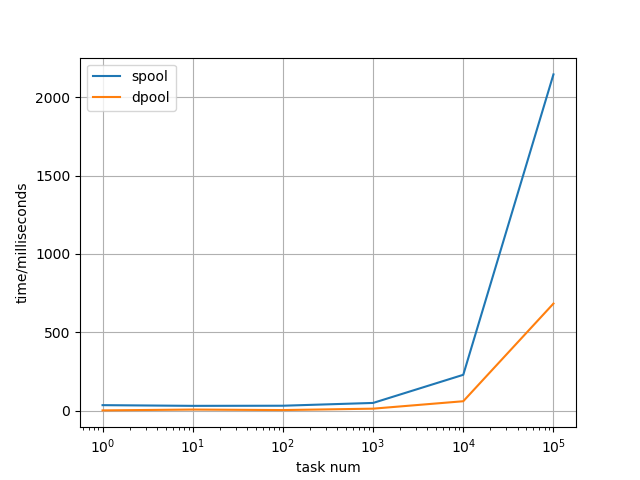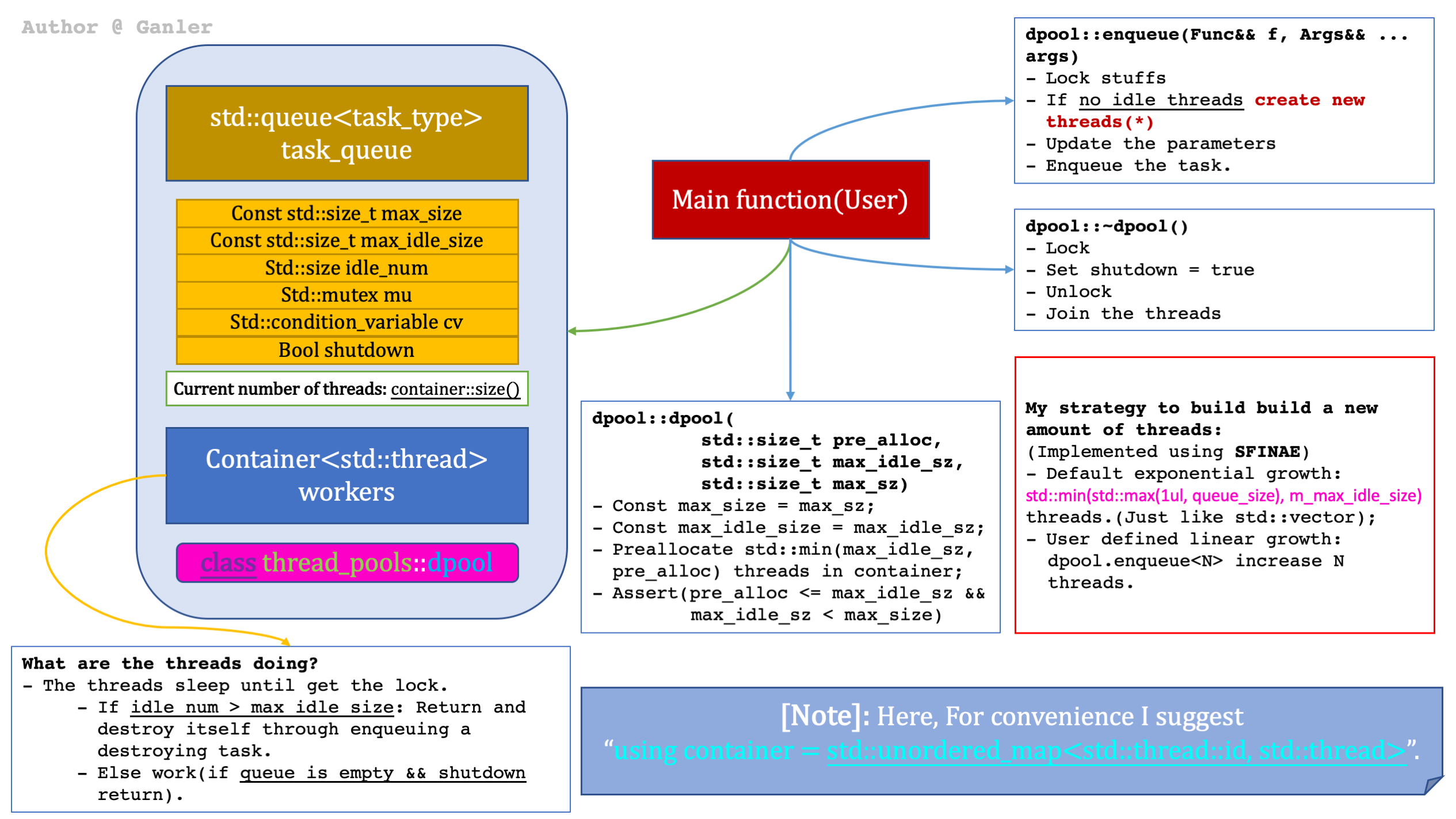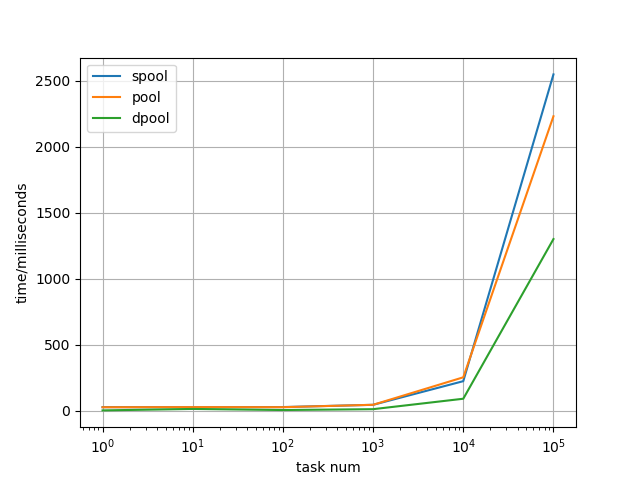Note that I rewrite this library and removed all thread containers(use detached threads instead). Hence,
default_pool(in old version) is no longer needed.
BIRTHDAY UPDATE
Currently I am making a bigger optimized attempt:
- Old version: We hold threads in some kinds of container(Dynamic/static allocation). We produce threads and join(main thread's waiting) them finally. I have to commit that what I did is kind of stupid.
- New version: I dropped all kinds of containers.(Detach them once created. Now it's container-free). Okay, you may ask what if the objects(like task quue) are destoryed in the stack. Fine, let's use heap memory managed by a
std::shared_ptr. This is brillient and low-cost(If you want accuracy, a thread-safe container is a must), as writes to atomic variables happends only when the threads is going dead(And last dying thread will destroy the sources).Now I've implemented this idea on my
static_pool(And I deprecateddefault_poolas we need no longer thread containers).static_poolin this new version is 31.8%(see more details in benchmark section below) faster than old version(as it's more "wait-free" and memory-saving). Optimized version ofdynamic_poolwill be released later(as its logic is more complex). : ).
#include <thread_pool.hpp>
#include <iostream>
int main()
{
thread_pool::static_pool<10> pool;
// thread_pool::dynamic_pool pool; // dynamic pool
auto result = pool.enqueue([]() { return 2333; });
std::cout << result.get() << '\n';
}In the last 2 days, I implemented 2 kinds of thread pools:
- thread_pool::static_pool: Static pool which holds fixed number of threads.
- thread_pool::dynamic_pool: Dynamic pool which holds unfixed number of threads(This is very efficient).
These kinds of pools can be qualified with different tasks according to user's specific situations.
However, I myself design the growing strategy of the dynamic pool. For a dynamic_pool(J, I, K):
- Dynamically adapt to the task size;
- The total threads are no more than K(Set by the user);
- The number of idle threads are no more than I(Set by the user);
- Create J threads when constructing.(Please make sure: J <= I && I < K && K > 0, or there will be a
std::logic_error)
using thread_pool
// Static pool:
constexpr std::size_t N = 10;
static_pool pool(N); // N is the number of threads this pool holds.
// Threads are created when construction function is called and destroyed when deconstruction function is called.
// Dynamic pool:
dynamic_pool(std::size_t = 2 + std::thread::hardware_concurrency(), std::size_t = no_input);
// The first parameter means the `max number of threads` it can have.
// The second parameter means the `max number of idle threads` it can have.
// The second parameter is 1/2 of the first one by default.
// For any pool.
pool.enqueue(Func, Args...);
// The parameters are just the same as that of std::bind.
// See https://en.cppreference.com/w/cpp/utility/functional/bind for more details.
// For dynamic_pool.
pool.enqueue(Func, Args...); // When there's no idle threads, increase the number of threads adaptively.
// added = std::min({m_task_queue.size(), m_max_idle_size, m_max_size - m_workers.size()})
pool.enqueue<N>(Func, Args); // When you give it a template parameter, you can add threads number linearly.
// added = std::min(Sz, m_max_idle_size)// Only for dynamic_pool
std::size_t current_threads(); // Number of threads alive.
std::size_t current_tasks(); // Number of tasks in the task queue.(which haven't been excuted.)I highly recomment you to read Herb Sutter:Use Thread Pools Correctly: Keep Tasks Short and Nonblocking.
- Header-only: Just move the .hpp file you to ur project and run.
- Easy to use: Just 2 API: Constructor and enqueue.
- Easy to learn: I tried to use lines as few as possible to make my code concise. Not only have I added some significant comments in the code, but I've drawn a figure to show u how I designed the dynamic pool as well. Good for guys who want to learn from my code.
- High performance: The results of the benchmark have shown this.
mkdir build && cd build
cmake .. && make -j4 && ./thread_poolCopy the output python script and run it. You can see the results.
(Note that each task cost 1m. For each pool, it can at most create psize threads to finish mission_sz tasks.)
Benchmark of new version. For 10000 tasks,
static_pool's performance has boosted by about 31.8% ((2200-1500)/2200).
Benchmark of old version.
For most thread pool library, they use std::shared_ptr pointer to manage the std::packaged_task<...>. This is not efficient as it allocation more memory for 2 atomic counter. And C++ standard made old C++ versions(C++11 and former C++14)'s unique_ptr not compile when enqueuing such tasks. Hence I decided to use raw pointers with some exception code to boost the performance.
After removing the shared_ptr. The performance has been boosted by about 20%~30%.
See my comments on static_pool::enqueue in static_pool.hpp for more details.
Old shared_ptr version's performance:
Mainly 2 situations:
- The amount of tasks are usually unknown.
- Your task running time is short(less than 3ms).
This comes to the benefits of my dynamic pool:
dynamic_poolcan be very fast when each task's run time is short, asdynamic_poolcreate and destroy threads very fast.dynamic_poolcan also be very fast whentask_num << max_size_of_the_pool, as it will dynamically change the thread size.
Note that: All the three pools will be the nearly same performance level when your task scale is:
- Each task cost a relative long time(much longer than creating and destroying the threads).
- Your amount of task is much bigger than that of your threads.
To show this, I tested their performance where each task cost 10ms(bigger than original 1ms):
- Thread pool that holds fixed kind of functions. (Reduce dynamic allocation when std::function<void()> SOO cannot work)
- Lock-free thread pool.
- Comparision with other libraries.







